Project of the century: Georgia starts to build Anaklia Deep Sea Port
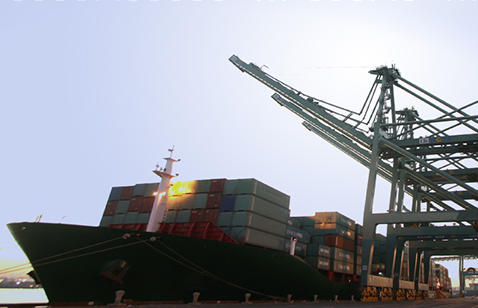

Georgia is taking a considerable step forward by enhancing its historic role on the Silk Road route, developing its economy and taking its logistic opportunities to the next level by starting construction of the Anaklia Deep Sea Port.
After two years of discussions the Governmental Commission revealed Anaklia Development Consortium was selected ahead of six other local and international companies to develop the mixed-cargo port on a build, operate and transfer basis.
The Anaklia Development Consortium will invest $2.5 billion USD in the Anaklia Deep Sea Port project.
The consortium was jointly established by local company TBC Holding and US firm Conti International. Negotiations are underway to invite a large Chinese company into the consortium.
The Anaklia Port’s mission is to create a new, faster maritime corridor between China and Europe, helping restore the historic Silk Road.
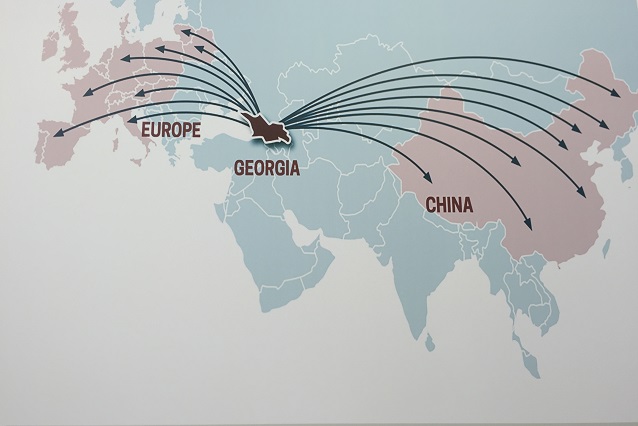
Anaklia Deep Sea Port is among the infrastructural projects that Georgia planned to implement to develop the Silk Road route. Photo by Agenda.ge.
Yesterday Conti CEO Kurt Conti said: "We are delighted and honoured to undertake the infrastructure development of Anaklia’s Deep Sea Port, and are looking forward to breaking ground.”
Representative of TBC Holding and chairman of TBC Bank supervisory board, Mamuka Khazaradze exclusively told Agenda.ge the consortium was excited to win the project.
We announced our expression of interest to the project that would better connect Europe and Asia [by allowing Georgia to receive larger cargo ships]. We feel the huge importance of the project and we feel the huge responsibility. At the same time we are happy to be winners and part of this historic project for Georgia.”
We managed to offer the best concept to the Governmental Commission. We are creating a consortium that will unite companies and financial institutions from the US, China, Europe and Georgia of course. Right now we are negotiating with one of the large Chinese companies,” Khazaradze added.
Khazaradze congratulated the Government on starting the Anaklia Deap Sea Project, which he said had been a hot topic of conversation since 1966.
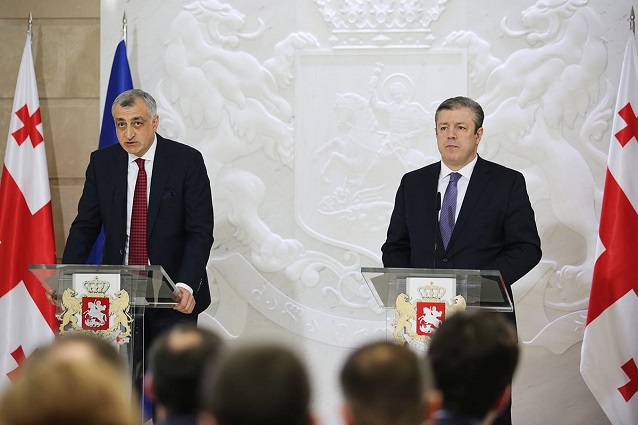
At a media conference on February 8, Georgia’s Prime Minister Giorgi Kvirikashvili announced Anaklia Development Consortium will implement the Anaklia Deep Sea Project. Photo by the PM's press office.
Meanwhile Moffatt & Nichol, a leading US-based global infrastructure adviser specialising in the planning and design of facilities, and Maritime & Transport Business Solutions, a leading international finance and strategy advisory firm specialising in the port sector were already involved in the project.
Construction of the Anaklia Deep Sea Port will start this year and will be renewed in 2017 following a nine-month study by international organisations to determine what impact the Anaklia Deep Sea Port project will have on the environment.
However, we will start building the port and once the results are revealed we will continue construction works following the study’s recommendations. This means that construction will start in 2016 and after the nine-month study it will continue in 2017,” Khazaradze explained.
Khazaradze assured the project "will not have any negative impacts on the environment”.
The Anaklia Deap Sea Port development will be separated into nine phases.
Firstly, the consortium must reach its first milestone in three years, where the port must be able to handle seven million tonnes of cargo per year and start official operations.
At the end of the final phase the Anaklia Deep Sea Port must be able to handle 100 million tonnes of cargo per year.
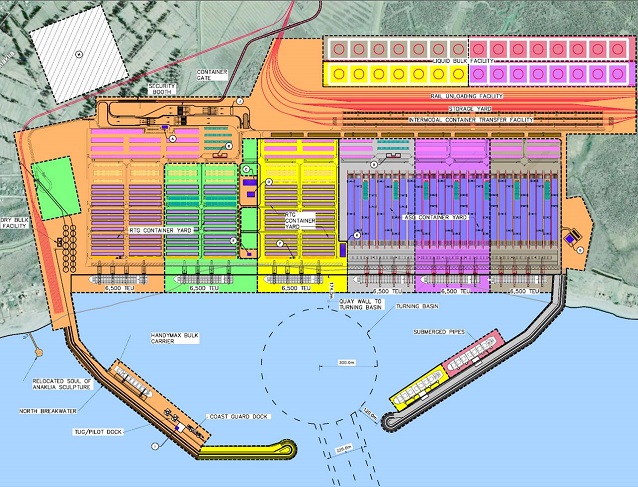
The Anaklia Deap Sea Port development will be separated into nine phases. Photo by the PM's press office.
In total 3,400 people will be employed during the construction of the Anaklia Deep Sea Port and 6,400 people will work at the port after it opens officially.
How was the winning company revealed?
The Governmental Commission selected a winning company that met the following criteria:
- Financial criteria – the candidate was obliged to present a bank guarantee worth $20 million USD;
- Technical criteria – the candidate should present a port development concept;
- Economic criteria – the candidate must show the financial model of the port which would be consistent with the port development concept; and
- Legal criteria – the candidate should provide comments and suggestions regarding the investment agreement.
Now that the winning company has been revealed, final negotiations between all sides must be held within three months to confirm details of the project. If the negotiations end successfully a 49-year agreement will be signed between the state and the company.
There are some legal issues which we are still discussing with the Government. Within three months we will solve all these technical issues and sign the agreement,” Khazaradze said.
The investor was obliged to plan, construct and operate the port for the next 49 years but after the agreement expired the consortium must give the port to the state. Additionally the state was obliged to develop railway and road infrastructure in the port area.
Why is Anaklia Port important for Georgia?
The Anaklia Development Consortium will build the largest port in Anaklia, a Black Sea city near Georgia’s breakaway Abkhazia region. When complete it will have the ability to receive large vessels with a 10, 000 container capacity. Once fully operational the port will be able to receive Panamax and post-Panamax ships – the largest ships able to pass through a canal with a cargo capacity of up to 40,000 tonnes.
The new multi-functional port will be located near Anaklia resort in western Georgia, spread over 400 hectares and have access to a deep sea canyon.
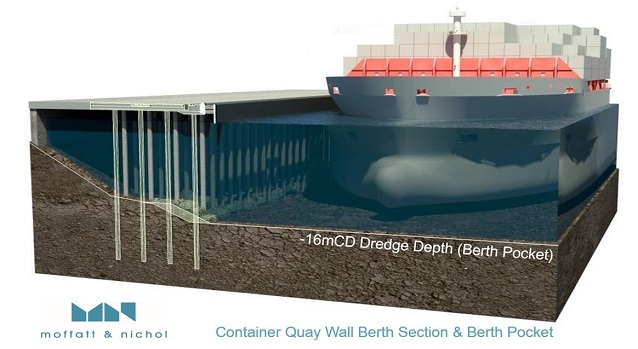
Anaklia Deep Sea Port will have the ability to receive large vessels with a 10, 000 container capacity. Photo by the PM's press office.
Furthermore, the authorities believed construction of the Anaklia Deep Sea Port will increase the importance of Georgia as a transit and strategic state in a trade and economic sense.
Anaklia Deep Sea Port is among the infrastructural projects that Georgia planned to implement to develop the Silk Road route.
The Government believed the new port would become one of the main attractions of Georgia and it expected this project would gain historical importance for the country and region.
Anaklia Port would be the shortest route to connect Europe to Asia. It has a strategic location on the new road that connects China to Europe,” said Georgia’s Prime Minister Giorgi Kvirikashvili.
The new port will reduce the time need to transport cargo from China to Europe by about two weeks. The port will develop the local economy not only in Samegrelo-Zemo Svaneti [the region where the port will be located] but also in the whole country. It will also deepen the trade and economic relations between Europe and Asia,” he said.
As well as building the Anaklia Deep Sea Port, development of logistics and industry zones and constructing an airport and liquid gas terminal are also planned for the region.
The Government also plans to announce a free economic zone on the territory of Anaklia Port,” Kvirikashvili stated.
He believed the Anaklia Deep Sea Port will increase Georgia’s capacity as a regional transport and transit hub.
How the Anaklia Deep Sea Port project came alive
In 2014 Georgia’s Ministry of Economy conducted a feasibility study to define the capacity and construction importance of the Anaklia Deep Sea Port.
The Partnership Fund (PF), a state-owned shareholding company, allocated 5 million GEL to finance the research. The in-depth analysis of ten possible locations between Enguri and Tchirokhi rivers across the Black Sea found Anaklia was the best place to invest and build the new multi-functional port.
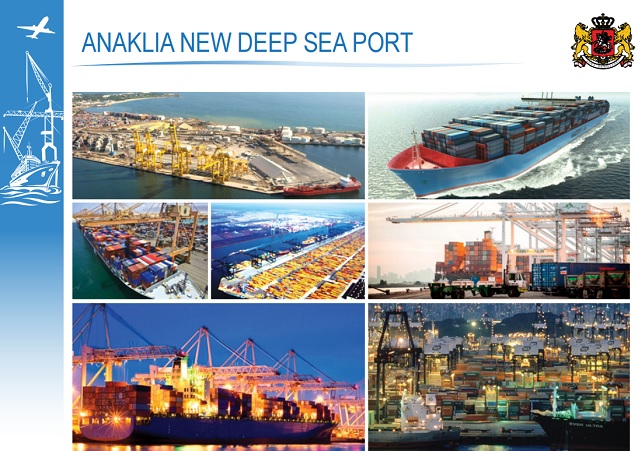
Anaklia Deep Sea Port project. Artist impression. Photo by Georgia's Ministry of Economy.
After earmarking the Anaklia area for development, Georgia’s Economy Ministry invited local and international investors to show their interest in helping develop Anaklia Port in western Georgia.
Twelve companies submitted expressions of interest and of this the Government shortlisted seven companies to move on to the next stage. The seven companies were from China, France, Georgia, Great Britain, Japan, Luxembourg, the United States and the United Arab Emirates.
How many ports currently operate in Georgia?
Four ports currently operate in Georgia: Batumi, Poti, Supsa and Kulevi.
Batumi Port operated through a concession by a wholly-owned subsidiary of KazMunayGas, a state-owned oil and gas company of Kazakhstan that mainly concentrated on liquid cargo but also handled dry bulk cargo and containers.
Supsa Port belonged to British Petroleum (BP) while Poti Port was operated by APM Terminals – an independent business unit within the Danish-based Maersk Group that mainly focused on dry bulk and containers.
Kulevi Port mainly dealt with liquid cargo and was operated by SOCAR, a state-owned oil and natural gas corporation of Azerbaijan.
 Tweet
Tweet  Share
Share